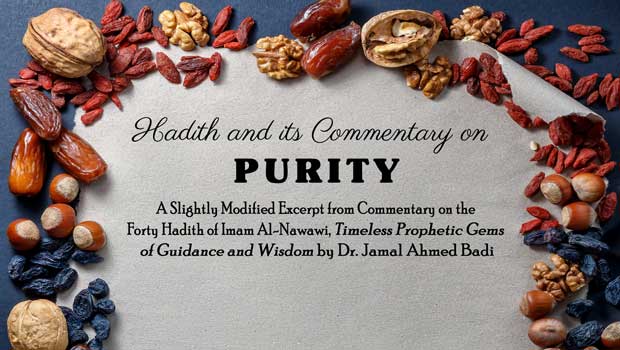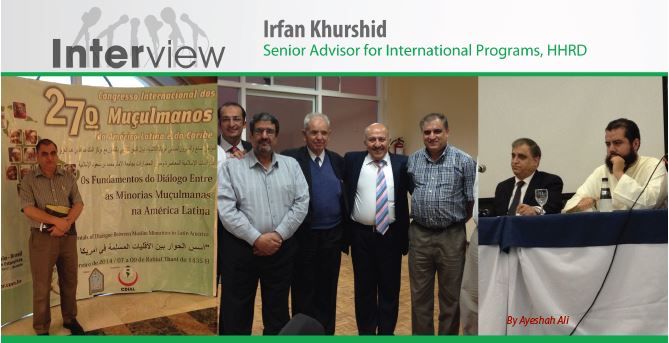An Excerpt from Commentary on the Forty Hadith of Imam Al-Nawawi
Timeless Prophetic Gems of Guidance and Wisdom
Abū Hurairah (R) reported that the Messenger of Allah (pbuh) said: “Verily Allah the Exalted is pure. He does not accept but that which is pure. Allah commands the believers with what He commanded the Messengers. Allah (SWT) has said: ‘O you Messengers! Eat of the good things and act righteously’ [23:51-53]. And Allah (SWT) also said: ‘O you who believe! Eat of the good things that We have provided you with’ [2:167-172]. Then he (the Prophet) mentioned the man who, having journeyed far, is disheveled and dusty and who stretches out his hands to the sky (saying): ‘O Lord! O Lord!’ whilst his food was unlawful, his drink was unlawful, his clothing was unlawful, and he is nourished with unlawful things, so how can he be answered?” (Ṣaḥīḥ Muslim).
Introduction
The word ṭayyib is used in the Qurʹān and Sunnah to describe actions, good deeds, people, things, and speech. This term is used linguistically to mean something which is good. Ibn Rajab interprets the word ṭayyib as “ṭāhir” or pure.
Lessons
A. Purity of Actions
The first phrase which this ḥadīth starts with is “Verily Allah the Exalted is pure.” This means that Allah (SWT) has all the attributes and characteristics which are completely pure and complete without any defect, weakness, or need. As for the phrase “He does not accept but that which is pure,” this means that Allah does not accept deeds which are not performed for His sake. This is even if the deeds on the exterior appear to be performed for His sake only, but in actuality contain defects in niyyah and sincerity. Such described actions may arise if the deeds are done for the purpose of showing off to others, or for some worldly gain. Similarly, such actions may not be acceptable if they originate from sources which are impure. And that is the focus of this ḥadīth. For example, donations to Islāmic causes in the form of money but from ḥarām sources will not be accepted by Allah (SWT).
B. Eat of the Ṭayyibāt
In Sūrah Muʹminūn, Allah (SWT) commanded the Muʹminūn in the same manner as He commanded the Messengers: “O Messengers! Eat of the ṭayyibāt” (23: 51). In Sūrah Baqarah, Allah says: “O you who believe! Eat of the ṭayyibāt that We have provided you with…” (2:172). These āyāt, as mentioned in the above ḥadīth, imply beneficial and useful rulings. The criteria for acceptance of our deeds by Allah (SWT) are the following:
1) The money that one earns needs to be pure and legal
2) The food that is consumed must be ḥalāl and permissible
3) The money one buys food with must be lawful, coming from lawful sources
The question of something being permissible or prohibited is decided by the decree of Allah (SWT). It is Allah the Most Merciful who explains, guides, and tells us whether something is ḥalāl or otherwise. As described in the Noble Qurʹān, situations have occurred in the past whereby people have declared something to be ḥarām when Allah has described it to be otherwise. Sūrah Yūnus states: “Say, ‘Have you seen what Allah has sent down to you of provision of which you have made [some] lawful and [some] unlawful?’ Say, ‘Has Allah permitted you, or do you invent [something] about Allah?’” (10:59). It is only Allah’s right to declare something lawful or otherwise. No one else has the right to make such a declaration.
C. Ādāb of Making Duʼāʹ
Earning and consuming in a ḥalāl manner is an important prerequisite for the acceptance of our duʼāʹ by Allah (SWT). The period when one is travelling is one of the situations when duʼāʹ is more likely to be accepted by Allah (SWT). Other situations when duʼāʹ is more likely to be accepted mentioned in other aḥādīth are the following:
1) When one is sick
2) During prostration towards Allah
3) During rain
4) During the last third of every night.
Such opportunities should not be disregarded since these are the times when our duʼāʹ is being accepted by Allah (SWT).
The ādāb or manners of duʼāʹ are mentioned in this ḥadīth. It is important to realize that duʼāʹ itself has its own etiquettes and ādāb. Failure of observing these ādāb may result in Allah (SWT) not responding to our duʼāʹ. The making of duʼāʹ must be done in a humble manner as opposed to doing it with any pride or arrogance. Our hands should be raised during the making of such duʼāʹ. Furthermore, it should be done in full eagerness. This may be done by calling upon Allah (SWT) by the repeating the phrase “yā Rabb, yā Rabb, yā Rabb” which means “O Lord , O Lord, O Lord.” It should be noted that duʼāʹ is a high form of ʼibādah and shows our reliance and dependence on Allah (SWT). Thus, it must be practiced by the Muslims with full eagerness and enthusiasm. We are forever in need of Allah’s assistance, guidance, and mercy regardless of time and day, and in every movement that we make. Furthermore, we are in need of His mercy more than our need for the air that we breathe.
Hence, if we want Allah to respond to our duʼāʹ, we must eat that which is pure and ḥalāl. Another principle extracted from this ḥadīth is the importance of supporting oneself through permissible means. One should live within one’s means, which will be blessed by Allah (SWT) if earned lawfully.
D. Ghulūl and the Trust of Public and Private Property
Another principle extracted from this ḥadīth by scholars is with regard to the trust of public or private utilities. This is similar to the property of another person or entity. This is related to ghulūl, which generally means stealing booty, zakāh funds, or the Muslim treasury, etc. It is important to note that ghulūl also occurs when unlawfully taking something from the property of a company, organization, or institution. Any property taken wrongfully from these tangible resources is considered ghulūl. This is an important issue because ghulūl is a major sin. Today, many Muslims unfortunately take this issue of ghulūl lightly. Examples include taking stationery from office, personal use of company photocopy machine, phone, funds, or other materials without getting the permission from the owner. Furthermore, we are also responsible for damage or vandalization of property, be it private or public.
Thus, ghulūl is essentially a kind of theft, something that is illegal. In fact, if one commits ghulūl, it is not expiated even if a person performs jihād in the way of Allah (SWT), until one pays it back. This is related in a ḥadīth about a martyr who took a piece of cloth from the booty of war as narrated by Abū Hurairah (R):
“When we conquered Khaybar, we gained neither gold nor silver as booty, but we gained goods, food, and clothes. Then we departed with Allah’s Messenger (pbuh) to the valley of “Al-Qirā” and at that time Allah’s apostle had a slave of his called Rifāʼah ibn Yazīd who had been presented to him by a man who had leprosy. While the slave was dismounting the saddle of Allah’s Messenger (pbuh), an arrow came and hit him. The people said, ‘Congratulations to him on his martyrdom.’ Allah’s Messenger (pbuh) said: ‘No, by him in whose hand is my soul, he had a sheet (of cloth) which he had taken (illegally) on the day of Khaybar from the booty before its distribution and has become a flame of fire burning him’” (Ṣaḥīḥ al-Bukhārī).
The ideal way in which we should be cautious regarding private/public utilities comes from the example of ʼUmar ibn ʼAbdul ʼAzīz (R), the fifth rightly guided khalīfah. While performing his public duty, he would light up a candle that was bought with money from bait al-māl, the entrusted Muslim treasury. He bought a second candle from his own money that he used for his personal affairs. Hence, whenever he finished acting in his public office, he would stop using the candle of the bait-al-māl and use his personal candle. Such notable actions and etiquettes should be emulated in the case of the stationery and items from our offices. These should only be used when performing duties which are within the scope of our employment. Furthermore, we should also ensure that we switch off the lights and other public utilities. Such practices will make us better Muslims and ensure that our duʼāʹ will be answered by Allah (SWT). Awareness must be raised among Muslims to be more responsible and not indulge in that which is ghulūl such as unlawful usage of utilities entrusted to us by others.
E. Consuming Pure Food
Another principle extracted from this ḥadīth relates to being careful about the food that we consume. We need to be aware of the ingredients of the food that we eat, whether from a restaurant or from packed or canned foods that we find in a grocery store. Extra caution needs to be emphasized especially if food is imported. We need to ensure that they are from lawful sources. Another issue is with food that can create problems to our health. We need to be aware of the various types of foods that can be detrimental to our health along with ensuring that they are “pure.” Schools and universities need to introduce health education so that the public can gain knowledge on food that is healthy. Muslims need to be knowledgeable about the preservatives, coloring, and chemicals used in foods. Foods which contain harmful contents are not ṭayyib.
In addition to the effects of food on our health, we see from this ḥadīth that it also has spiritual repercussions. Scholars mention that the food we consume affects our behavior and way of thinking. Furthermore, we should also eat in the proper manner as per the Sunnah, and not overindulge or eat excessively. The Prophet says (pbuh): “The human does not fill any container that is worse than his stomach. It is sufficient for the son of Ādam to eat what will support his back. If this is not possible, then a third for food, a third for drink, and a third for his breath” (Jāmiʼ al-Tirmidhī).
F. Accepted Ṣadaqah
Another ruling from this ḥadīth is that ṣadaqah is only accepted by Allah (SWT) if it comes from lawful sources. This is based on the statement “Allah is pure and only accepts what is pure.” Wealth that is obtained from unlawful sources cannot be given as ṣadaqah or be used in performing any form of worship. An example of this is when a person uses unlawful money to perform ḥajj. In this context, Ibn ʼAbbās (R) had stated: “Filth does not expiate filth.”
According to the scholars, if someone stole money, then it must be returned and not be given away as ṣadaqah. This is particularly applicable in the case of a person wanting to do tawbah after committing theft. The person must return the money to the rightful owner. However, there may be cases when this is not possible, such as when the owner is not known or cannot be found. In this case, some scholars are of the opinion that the money equivalent to the stolen money can be given as ṣadaqah on the owner’s behalf or be used for public benefit such as making roads, schools, etc.
Conclusion
The main point from this ḥadīth is that we need to consume food which is ṭayyib and in the right manner as prescribed by Islām. The status of ṭayyib is attained when we ensure that we are earning, eating, and drinking from the ṭayyibāt in addition to giving ṣadaqah from it. This will then allow our actions to be ṭayyib as well, and be among those who are ṭayyibūn, pure and blessed by Allah (SWT). Doing this will inshā Allah lead us to become better Muslims with a better īmān and a purer heart devoted to Allah (SWT). Then everything that we do can be described as ṭayyib.






